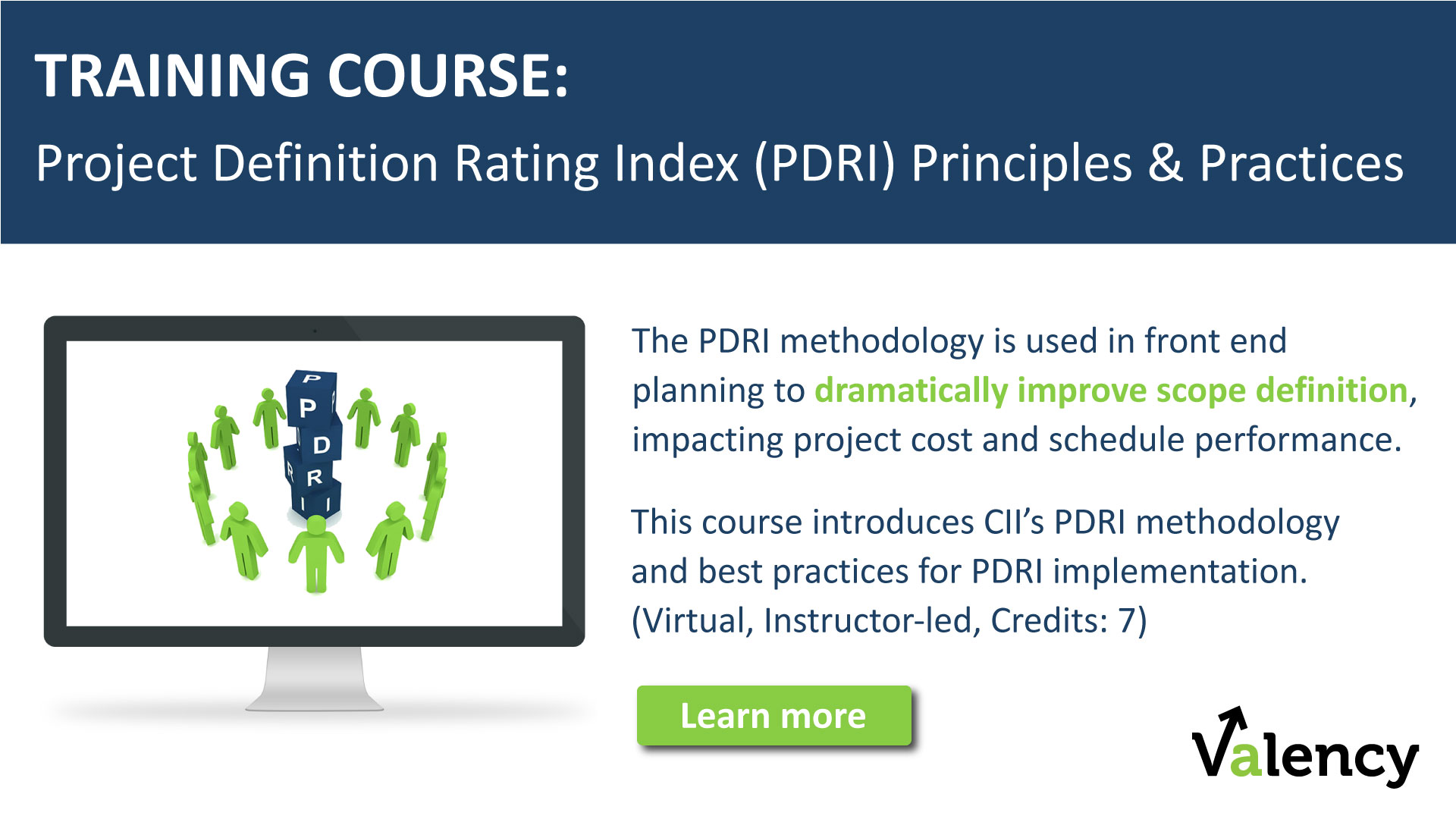Everyone benefits from a well-defined project, and it takes many people to do a project well. In this post, I will explain how you benefit from participating in a PDRI session based on your role within the project/organization.
It is important to understand how each participant’s contribution benefits other members of the project team and what insight you can gain that will benefit your role in the project.
If you are a PDRI facilitator, these points can help to gain buy-in from your core project team members and justify their time investment to participate in a PDRI workshop.
Project Sponsor
As the project sponsor, making sure the project is off to the right start is critical to achieving your business objectives on time and on budget.
A PDRI workshop is an excellent way to communicate with all project stakeholders and ensure business objectives for the project are clearly understood.
In addition, it’s a great opportunity to communicate any updates. Several team members such as engineering, operations, maintenance, subject matter experts are not always aware of recent developments and decisions that have been made regarding the project. The project team will be appreciative of the effort and will be more aligned with the project goals and objectives.
And finally, with the right facilitator, a PDRI will expose potential risks which can be addressed early in the process to avoid potential surprises during execution.
Project Manager
Project Managers generally have the most complete view of the project because they communicate with all stakeholders and team members.
If you’re the project manager, the biggest win from your perspective is how much benefit you get from the increased team alignment.
Communication is key – so if you can take a workshop like this and use it to increase your team’s overall understanding, they’re going to help to support you to get better results.
With larger projects that have a longer duration for front end planning, it’s helpful for everyone to understand where you’re at in the process in terms of the level of maturity of the scope as it relates to the overall timeline.
Especially at the end of Concept phase, a PDRI workshop is one of the best ways of aligning project objectives and stakeholders’ needs, emphasizing high priority project deliverables, identifying assumptions, gaps and risks, ultimately helping to eliminate late project surprises.
Engineering
Whether the engineering teams are internal, external or both, they’ll usually attend but they don’t always feel a PDRI workshop is an effective use of their time, but it absolutely is!
If you’re an engineer on the team, a PDRI workshop is an excellent opportunity to gain clarity on business objectives you might otherwise not know about.
In addition, this is your chance to get your questions answered directly from other team members and to collect input from Operations, Maintenance and Construction to help establish a solid design basis as early as possible.
Operations and Maintenance may be able to provide you with important input during the planning stages such as:
- Guidelines for reliability, maintainability, operability
- Manufacturing philosophy
- The “must-haves” to be evaluated during feasibility and concept
- Future expansion considerations
- Existing conditions
- Points for early consideration of handover requirements
In terms of scheduling and sequencing, a PDRI session is a good opportunity to verify assumptions with various stakeholders on how to best plan the execution stage of the project.
And finally, if there has been any change on the core design team, or the previous phase was conducted by a different engineering contractor, this is an excellent way to update the project team and have the new person become acquainted with the project and the project team – who is responsible for what and who their resource people will be.
Operations & Maintenance
It’s very important to be aligned on the operating and maintenance philosophy and the PDRI structures so that those questions are some of the very first that you start with. We know operations and maintenance reps are usually very busy and they’ll see within the first ten minutes or so how important their input is.
As an operations & maintenance rep, it’s important to inform the project team of any particularities of your site and your personnel.
If there are any concerns you have at this point with regard to decisions and assumptions being made, it can be very beneficial to the rest of the team to be made aware of this early on.
When discussing the Execution approach, there are some elements that will generally talk about what the handover requirements are, training requirements, data for your asset management systems, so there are some good questions to help collect our input and requirements and get any clarification you need at this point.
Construction
Time and time again, early input on constructability consideration ensures you have the planning phase aligned with the execution phase and people talking early.
As it relates to the design, this is your opportunity to highlight your specific challenges relating to constructability (physical site issues, labour concerns, logistics, sequencing, etc.)
By bringing construction-specific issues and concerns to the table during the planning stages, you may alleviate potential risks, surprises and project modifications that you would otherwise have to mitigate during construction.
Procurement
The acquisition strategy many times drives the project schedule and the project team may not be aware of all the considerations.
During a PDRI workshop, Procurement can inform and instruct the team on critical aspects of procurement and contracting.
All PDRI templates have questions that dig into long lead items, not all projects have this but this discussion is going to come up but there’s a good opportunity to have a stronger relationship and communication link between your engineering and your procurement representatives so that those activities work very seamlessly together.
Project Controls
This is an opportunity for project controls to get a thorough overview of the whole scope of the project. They are often very quiet and we sometimes ask the Cost Estimators or the Schedulers “I didn’t hear too much from you, did you get value from this exercise?” Every time their response is “Absolutely! I learned so much and I have a list of items I’m going to follow up on and I really appreciated the opportunity to learn.”
So even if they are quiet, there’s a lot they take away from these sessions and at the end of the day, whatever we can do to help them improve their estimating when it comes to contingency, that’s going to be of value to the project.
Subject Matter Experts (SMEs)
Subject Matter Experts often cover specific areas of the project such as environmental and regulatory compliance, health & safety, security, historical buildings, etc.
The level of involvement of SMEs varies greatly from project to project, making it particularly challenging for the SME to get all the information required to make informed decisions regarding the project.
As an SME, it is common that the project team will not fully understand all of the particularities of your subject matter and involvement.
This is a great opportunity for you to provide input, where appropriate, to explain your role and the scope of the work you are doing, how this may impact the overall project, and where you could benefit from others on the team.
The PDRI workshop will help you to understand both the overall goals and objectives, and at the same time hear about some of the intricacies of the project that may impact your involvement.
Your area of expertise may require interaction with regulatory agencies and by getting involved with the entire project team during the planning stage, you will be able to inform all project members of these requirements, and related timelines, to help you, and the project team, better plan and schedule related activities.
Hopefully, this post has helped illustrate the importance of committing to having the full project team in attendance at your PDRI workshop.
In preparation for a workshop, the more familiar each team member is with their role in the assessment, the more productive the session will be.
There are some key techniques you can use to prepare and engage each workshop participant to encourage a productive PDRI workshop. We cover these in our virtual, instructor-led course: PDRI Principles & Practices.
Over twenty years ago, the Construction Industry Institute introduced the PDRI methodology. As a CII Registered Education Provider, our team at Valency supports organizations like yours around the world in implementing game-changing practices like this one.

